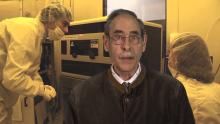The Master's degree programme will help you acquire sound knowledge in physics of matter, physics of interfaces and materials process technology. At the same time, you will gain skills that range from design to creation of nanoelectronic devices and systems, MEMS, microsystems and nano-biotechnology solutions.
The programme has two elective specialist tracks:
The Master's Degree in Nanotechnologies for ICTs is taught entirely in English.
You will learn through lectures complemented by classroom exercises and thanks to computer and experimental laboratories, some of which are also in clean rooms, thanks to the availability of cutting-edge facilities.
You will have the opportunity to collaborate with colleagues of different nationalities and to share extra-curricular experiences. A unique characteristic of the students of the Nanotechnologies for ICTs course is the strong sense of community, demonstrated, for example, by the social groups that are always active in providing support and guidance to new enrollees, especially for international and double degree courses.
In the last semester of the program of both courses, you will work on a thesis project that you can choose to carry out in any Italian or international company or university or research center of the highest level throughout the world.
